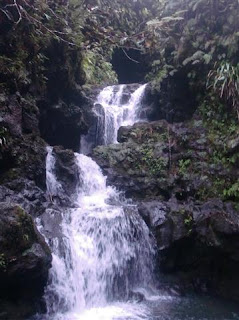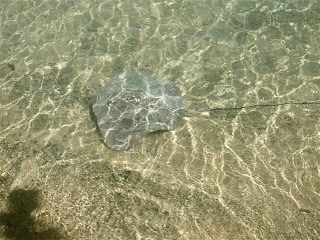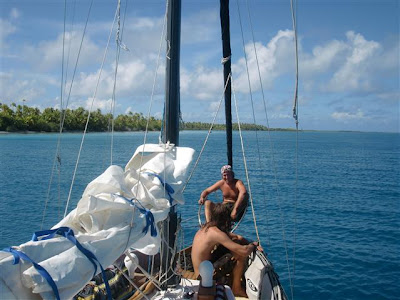 |
| Approaching Tahiti- Point Venus just visible, where Capt. Cook made his famous observations of the transit of Venus. |
 |
| Papeete Harbor. Busy. |
Entering the pass into Papeete Harbor
we passed to port some surfers riding little waves at the end of the
jetty, just inside the (red!) channel marker. We passed commercial
shipping vessels, hotels, and waterfront parks chock full of
busy-looking people and romantic-looking people and people jogging
for fitness. Countless outrigger canoes glided silently past. We made
way for the yacht quay where we would tie up in downtown Papeete.
Looking astern, the sun fell slowly toward Mo'orea twenty-five miles
west and I could feel in my chest the allure of Tahiti. The site of
her invoked the sense of that satisfying, indulgent refreshment one
gets from the first sip of a frosty beer after a long day on the
water. Exactly what I needed. Tahiti. Right down the gullet.
The Pacific had belted us for two days
with southeast trade winds reinforced by a strong high pressure
system (anticyclones in the southern hemisphere) to the South- the
squash zone, as it's known- and a mixture of swell directions as
thoroughly diverse as the campaign ads surely being distributed well
at home these days. It was an onerous, if short passage, though Ardea
herself didn't seem to notice. Her captain, though, licked by a bit
of treachery from the sea, couldn't help but ponder the various
virtues of a terrestrial lifestyle...
(I wonder what they did during the
howling winds and sloshing seas? Maybe they went to a movie theater,
or a restaurant, or maybe a bar. Maybe they just slept and didn't
even notice it going on. It accentuates in my mind the notion of
having become alien to urban, the thought that people here were
dancing in nightclubs the night before while I, just a hundred miles
away, clung to the steering wheel soaking wet in my boxer shorts in
pitch dark composing a symphony of curse words and other angry sounds
and trying to keep the boat pointed down the waves.)
Taking in the surrounding city, I felt
duly out of touch with this type of life. I wondered if a month at
sea followed by two in some of the most remote places in the world
had begun to construct barriers to communication beyond that of
language, for what else did I have to talk about but the wind and the
clouds, the currents and the swell and little bits of rock cropped up
in the middle of the Pacific providing refuge and small, welcoming
communities? I wasn't feeling cynical. No, it was that I felt a
misfit among the landlubbers whose daily activities and suite of
decisions, risks and consequences were so dissimilar to what mine had
now been for six months. It was a strange feeling to be back in a
city, but don't doubt that we were entranced and delighted and drawn
powerfully by the madness we observed from the quay.
Cars buzzed by, neon lights shone on
hotels and restaurants, people were all over the place, hustling and
bustling and all that city stuff. It had been so long. We settled in
and caught up with Slick and Desolina, docked nearby. We washed and
drank from the dockside spigot and wandered through Papeete proper.
The spiteful seas of our passage from Faka Rava and the lengthy
isolation from any sort of population center gave this city a
brilliant novelty in our eyes. I, for one, was more appreciative of
the city life than I had been for a long time. The variety of choice
was tantalizing. In spite of a greater anonymity than I'd experienced
in three months, I felt shy, a bit withdrawn. Still, I was tickled by
the sight of so many people and so much activity.
We wasted little time in exploring the
modern delights of an international metropolis, our energy renewed by
quixotic pleasure. We ate hamburgers at a restaurant and finally
drank a bit of ale; the mediocrity of the food and the expense of the
beer were well mitigated by the ironic feeling of serenity in the ant
farm of humanity. The boat secured in safe harbor, the ground solid
beneath our feet, only a bit of automobile traffic and the occasional
ruffian to worry about, the guard could be dropped a little, for a
while at least.
We should have been exhausted, but Dana
and I wandered the many wharfs of Papeete Harbor late that night. A
downpour kept us beneath a tree for a time, waiting patiently; we
could have remarked at how easily it came, this patience, that it
wasn't irksome to slow or be slowed, that we'd changed a bit in our
pace and perception. Released by the passed front, we walked over
damp asphalt and swung open the creaky gate to a long quay lit by a
row of orange lights where there was tied a ketch of at least a
hundred feet in length. We meandered along staring at the vessel. The
turnbuckles seemed as big as I, the masts far too wide to be wrapped
by my wingspan. There were at least three large tenders about. We
stared a bit in awe at the magnitude of the ship, contemplating the
juxtaposition of equipment and experience. All I could think to say
to Dana was, “Well- we came to the South Pacific on a ketch, too.”
We walked slowly away pretty sure we
preferred the immersion of our experience, the mental impacts of a
gnarly two days' passage already fleeting. We went to the food
trucks, still open at midnight, and had second dinner. It was
amazing, phenomenal in fact, to have this option, but we were quite
sure that the seductive powers of well-developed civilization would
soon wear away.
For several days in Papeete we remained
entranced and intrigued. We visited the huge market where everything
from trinkets to parrotfish are available for purchase and enjoyed
cheaper beer from ample well-stocked grocery stores. We settled in on
the quay and made friends with some new folks, Michael, a Scotsman on
a boat called Barfly, and Troy, an Aussie on a boat called Yameja,
both hilarious dudes of the best possible sort, with whom I would
find myself spending a good deal of time in coming weeks. Mike, whose
well-projected, ceaseless voice seems to rub its accent off on
everyone, left Glasgow two years ago and has since crewed on five
different boats en route to a piecemeal circumnavigation while
surfing every wave he can find. Troy is making his way back home over
the big blue crewing on a catamaran. Both had skippers away for a
month and were meant to watch their vessels and enjoy Tahiti in the
meantime. This we all did, with plenty of beer-fueled banter in the
spacious aft gallery of Yameja.
It wasn't all beer and steak frites,
though. Actually, we began a continuing stint of high activity there
in Tahiti. The crew of Ardea made the grueling hike to the lava
tubes, which were fascinating bits of geological history. We managed
to find our way to the local soccer pitch- fittingly a fine
artificial turf field complete with cork track just outside of the
downtown area- for a couple of evening games. Dana and I accompanied
Mike on the bus to Papenoo, one of the few beach breaks around, and
caught some of the fabled Tahitian waves (ok, well, Teahupoo is
fabled, and there are other insane reef breaks as well, but Papenoo
is on a whole different, much lesser, level).
 |
| First lava tube. |
 |
| Clambering between lava tubes. |
 |
| The second lava tube atop the falls. |
 |
| Clambering down from the second tube. |
We stayed in town long enough to pick
up Anna, who came to join the boat for a while, but by then the
charms had mostly diminished. I noticed I was sensitive to the more
polluted air, the lights and the general indifference among city
peoples. It was noisy, too. Traffic was unending and passed just near
the quay. That alone wasn't terrible to sleep through, but one night
after a rain the roller for the ramp on the next dock over began to
squeak a loud, high-pitched whine. It was irritating to me, so at
0230 I walked off the dock, down the waterfront a bit, and climbed
over the fence to the offending bearings. I went to town with my
bottle of WD40 and shut the thing up, longing already for the quiet
of a secluded bay with stars unencumbered by city lights, the distant
drone of the breakers over the reef and the lapping ripples on the
hull the only persistent sounds.
Soon we planned to make the short
crossing to Mo'orea, only about 25 miles. Dana would be flying home
soon for good and I would be leaving for a hiatus to join my family
for my grandparents' fiftieth wedding anniversary, so I wished to get
Ardea to Cook's Bay where she would be safe and where Dana could get
a last taste of the majesty of the South Pacific. He and I wanted to
catch a few more waves in Tahiti, though, so we left early to get the
bus to Papenoo for a morning session before departing to Mo'orea in
the afternoon. Little did we know, the bus was not running, as it was
some holiday, and we found ourselves sauntering through Papeete in
the general direction of Papenoo. We had only what would have been
bus fare and our surfboards. We spent the former on beer and a
baguette and wandered merrily, making conversation with numerous
characters attracted to the comical scene of a couple of Californians
with surfboards who seem to have entirely lost the direction of the
beach. It was an enjoyable meander, an appreciated look at the outer
parts of Papeete and a slow brew in the subtle differences between
this place and those we'd prior seen.
The jaunt to Mo'orea was windless. We
motored the whole way, stopping for a time off of the northwest coast
of our destination to splash and swim in the deep blue yonder.
Pulling into Cook's Bay was for me an emotional experience, full of
nostalgia and a deep satisfaction; I had studied at the Gump Research
Station, a UC Berkeley field lab, for ten weeks in 2009, and knew and
deeply loved the place. To putt past the old digs on my own vessel
three years later represented something of significance for me, and I
gazed almost in disbelief at the familiar and breathtaking landscape
after we set the hook deep in the bay.
We made the usual rounds to friends'
boats to catch up as the sun was setting. Soon after, the sound of
music carried across the water to our ears, finding us want of a
scene to explore. We went ashore and followed the tunes to a nearby
lot where loads of people played bocce and celebrated life. It was
only local Polynesians about, so we quickly attracted attention and
found ourselves awash with conversation and hilarity. A large red
canopy in the corner housed the band- drums, ukuleles and guitars- as
well as a counter behind which a small crew prepared food, sold beer
and organized the bocce tournament. We ate and drank and chatted
about while local men, plainly drunk, played the best bocce I've ever
seen. Dana, recalling our experience on Tahuata with Jimi and John,
motioned toward one particular game after a ball came to a halt just
next to the target, saying to a new Tahitian friend nearby, “Attack,”
except with the proper accent making it sound more like “Ah-toc.”
Thus began several minutes of uproarious laughter as the local guy
went about telling his friends how the American guy, who speaks no
French, knows “attack” as relates to the game.
Some time shortly thereafter, Dana
learned that in that there tournament, the top prize was no less than
a 20 kilo calf, fully butchered. He quickly decided to enter for a
thousand francs and try his luck; I became his teammate, so it became
our luck. We would need it. Dana told the woman behind the counter
under the canopy that he would like to enter the tournament and
presented her with the appropriate currency. After a few minutes of
her trying to persuade Dana that his entry was a waste and that he
might find a non-monetary game in the early afternoon on the
following day, she accepted his money and wrote down his name on the
bracket. It should be noted that Dana, as so many of us, alters the
name he gives people slightly in order to assimilate the sound with
whatever language is spoken. In Mexico, Dana was Dan, I was Con-Nore,
and Taylor was Tay-Lore. In French Polynesia, Dana is Don, I am
Connair, and Taylor is pretty well understood.
Don and I showed up to our first match
and our opponents greeted us, shook our hands, stood back and gave us
a quizzical look. Obviously we hadn't realized that it was BYOB. We
had beer, but we were forced to delay the game until the neighboring
match finished, so we could borrow someone's balls. The nice lady
behind the counter, who spoke quite good English, coordinated the
loan for us after Don approached her regarding the embarrassing lack
of balls. Once equipped, we began what would be possibly the most
uninspired and brief games ever played on the island of Mo'orea. Don
and I were caught off guard. It happened so fast. We played to seven,
lost in two rounds, the minimum possible. It's redundant to point it
out, but we did not score any points. They barely even needed to
attack.
We sauntered for a minute or two after
our opponents laughed and thanked us and walked away. The woman from
behind the counter saw me. I told her we lost. She picked up the
microphone and the loudspeaker blared, “Don, you have lost. Please
return all the balls. Very embarrassing.” And so another bout of
laughter focused our way as our short careers in competitive
Polynesian bocce came to an end. Perhaps our real problem was in
treating it just like bocce. Really, they call it petanque, and the
balls are slightly smaller and made of metal. In fact, it's starting
to seem like a cut and dry case of equipment-based disadvantage.
Trade for some ceramic balls of increased diameter and we'll see
who's attacking.
Obviously we considered entering a one
thousand franc cash side bracket, but, in the end, we figured all the
sport was cutting into our time with beer and new friends. So we
partied on in fine fashion well into the night, as it was Dana's last
and there remained many Hinanos to hold in toast to such a fine
seaman. Surely the following morning was imbued with a melancholy
ink.
Dana and I took the ferry back to
Papeete and celebrated the many thousands of miles of ocean we had
together traveled over beers with Troy and Mike. We were, in the end,
happy to have experienced what trying weather we had on the
California coast and finally again en route to Tahiti. We survived
and kept the boat safe and now we sat in one of the most captivating
places in the world having accomplished something that only just a
few years before had seemed an improbable dream. Though I was on all
too many occasions a cantankerous captain, I couldn't in retrospect
make any complaint about Dana's fine service on Ardea. To be sure,
while he began as a novice crewman, he departed among the ranks of
capable offshore sailors, a proud accomplishment. Dana took off late
that night and made it home some twenty-four hours later, albeit with
staph infections on both feet from festering tropical wounds
(reportedly healed). I left a day later, excited to see my family for
an intermission, wondering about the new chapter of this journey to
follow.







